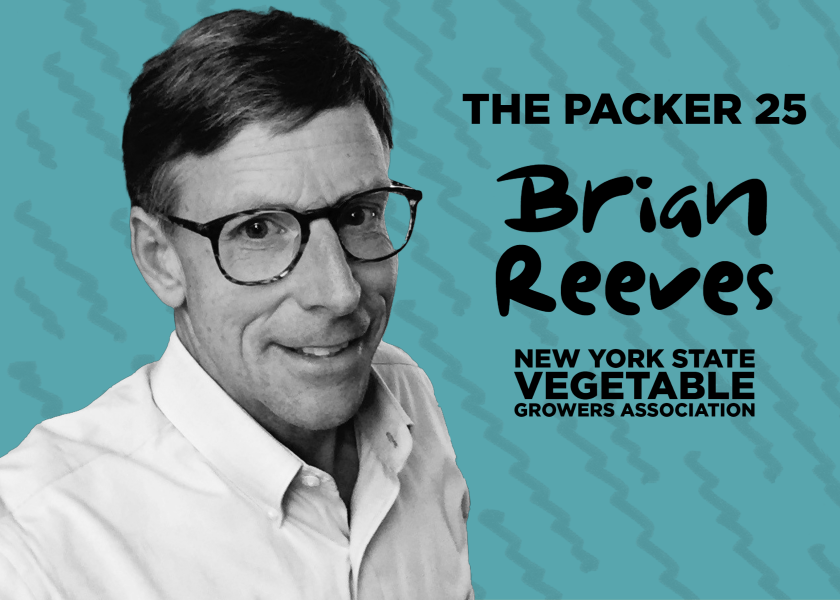Packer 25 2021 - Brian Reeves

How did you get your start in the produce industry?
I was kind of born into it. I grew up on a farm here we own. My parents farmed and myself and my brothers all grew up on the farm. I did go away for one year in graduate school that I thought I was going to be an experimental psychologist, and then I ended up coming back to the farm. In high school I always had an interest in the human brain and psychology and all that, and I still find it very interesting, so I was a psych major in college and I was offered a fellowship to Ohio State for experimental psychology so I went there and tried it for a year. That went well; I enjoyed it, but I kind of missed working outdoors and all that stuff, so I came back to the farm.
What does your family farm?
A variety of fresh market vegetables and berries, strawberries, blueberries, sweet corn, cucumbers, summer squash, winter squash, peppers, tomatoes, onions, and just a wide variety of stuff.
What’s your favorite crop to grow, eat and sell?
Depends what do you mean by my favorite. My favorite to eat is probably strawberries; my favorite to sell is probably sweet corn. To grow … probably corn. I'm just thinking about what’s simple and what seems to work out well — come rain, come shine it seems to come through OK. With some of the other crops, if the weather’s rough, the crop is rough, and that’s no fun.
What other companies or organizations have you worked for?
I was in grad school for a year and technically worked for the college — you know how that works. I had a fellowship there doing research. But after a year I came back to the farm, so I’ve always either worked for my parents or came back and work for them. Then in 1990 my brother and I took over the farm — we began purchasing it from my parents.
Tell us a little bit about your role at the New York State Vegetable Association.
Well, I’m the president of it. I’ve been a board member for 20 years or something. And it’s all volunteers. The board is all farmers and we all just volunteer our time. One of the things that I did yesterday, I testified at a hearing (because) the Albany legislature wants to ban a certain type of insecticide, a certain class of insecticides in New York state. And so I was specifying on how they’re kind of essential for some vegetable production and they’re part of our tools in our toolbox for Integrated Pest Management, and that they ought to think twice about banning something. I mean, you can regulate it, you can reduce it, you can educate people, but when you ban and you ban, you know, it’s kind of an extreme move.
Do you have any passion projects you are working on?
Farming is kind of a whole lifestyle. You’ve heard this before from farmers: it’s your work, it’s your lifestyle, it’s your life. It’s what I’ve done most of my life, so I guess you’d say that’s as much passion as there is.
We've been pretty well involved with other legislation in New York state too. Two years ago they passed a labor law, which introduced overtime in our state. If you work more than 60 hours a week, you get paid time and a half. And there were some other provisions in it too, in the bill, and one of the
provisions they created is a wage board, which conducts hearings and listens to people, and their goal is to get it down to a 40-hour threshold — or to, you know, overtime after 40 hours. And so we’ve been pretty involved in trying to give our side of the story on how farming truly is different. (Being) seasonal in nature, you’re depending on the weather, and it’s a perishable crop. And there’s no other industry that quite has our restrictions, and there’s a good reason why we should keep that threshold at 60 hours. I don’t know if they’ll be successful or not, but that’s kind of an important task that the vegetable growers have undertaken to try to maintain that 60-hour threshold for overtime.
What does leadership mean to you?
I think leadership goes hand in hand with being a manager, too. And I would say, part of it is trying to fit your coworkers into the best place where they can be the best at what they do.
And often if you’ll ask (friends) “What’s the worst employee you have?” I maintain that the worst employee you can have is one that does not want to be there. But being a good leader and a good manager is putting the right person in the right job and knowing their limitations and getting the most out of it, then allowing them to do their best and offer constructive criticism where it needs to be, but also positive reinforcement when they do a good job. You’d be surprised how a little positive recognition —I mean little things — can make a happy worker, and those happy workers want to be there, and then they end up being good employees.







